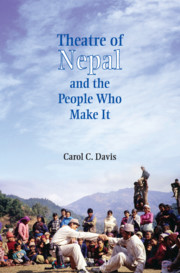Book contents
- Frontmatter
- Dedication
- Contents
- List of Figures
- Acknowledgements
- Prologue
- 1 From Darkness to Light: Antiquity through the Malla Golden Age
- 2 Ruthless Rulers: The Rise of the Shah and the Rana Takeover
- 3 The Drama of Nationalism: Sama Engaged
- 4 Modernism's Advance: Post-Sama Dramatists
- 5 The Pro-Democracy Movement: Ashesh Malla Takes to the Streets
- 6 Cultivating Theatre Aesthetics: Sunil Pokharel's Vision
- 7 Diaspora: Urban Theatre Outside the Capital
- 8 Legacy: Contemporary Theatre in the Kathmandu Valley
- Bibliography
- Index
6 - Cultivating Theatre Aesthetics: Sunil Pokharel's Vision
Published online by Cambridge University Press: 26 April 2019
- Frontmatter
- Dedication
- Contents
- List of Figures
- Acknowledgements
- Prologue
- 1 From Darkness to Light: Antiquity through the Malla Golden Age
- 2 Ruthless Rulers: The Rise of the Shah and the Rana Takeover
- 3 The Drama of Nationalism: Sama Engaged
- 4 Modernism's Advance: Post-Sama Dramatists
- 5 The Pro-Democracy Movement: Ashesh Malla Takes to the Streets
- 6 Cultivating Theatre Aesthetics: Sunil Pokharel's Vision
- 7 Diaspora: Urban Theatre Outside the Capital
- 8 Legacy: Contemporary Theatre in the Kathmandu Valley
- Bibliography
- Index
Summary
Arts must reflect the society and its issues.
In other words, human beings must benefit from the arts in some ways
—Sunil PokharelThe success of the peoples’ theatre lay in its proliferation through multiple theatre troupes. Inspired by their leader's passion and relying on their first-ever experience of theatre with Ashesh Malla, some activist theatre workers went on to form theatre groups of their own. Among Malla's close associates in the early years of Nepal's engaged theatre movement, Sunil Pokharel (b. 1963) became a dynamic force behind both Nepal's social action theatre and the growth of aesthetic theatre in Kathmandu and beyond. Initiated into theatre during the drive for democracy, Pokharel performed with Malla in the early days of Sarwanam before breaking away and founding his own troupe that would go on to become the most influential theatre of its generation.
With Badri Adhikari, Basanta Bhatta, Bhairab Chhettari, Samanta Kansakar, Pradeep Shrestha, and the sisters Chandramala Sharma, Nisha Sharma, and Suryamala Sharma, Pokharel formed a theatre group aimed at presenting ‘meaningful’ theatre. They adopted the name Aarohan, meaning ‘to climb higher’ or ‘to ascend’. Pokharel acquired further theatre training at the Royal Nepal Academy, with its stable of actors who performed only for the elite in the government sponsored theatres. From 1984 to 1987, Pokharel studied directing at India's National School of Drama as the first Nepali student to matriculate there. During holiday breaks from drama school in New Delhi and after graduating, Pokharel returned to Nepal, gathered the members of Aarohan together again, and took up the political mantle to perform street theatre in the concerted effort to win democracy. Pokharel's formal theatre training and exposure to world drama combined with his natural instincts to result in sophistication previously unknown in this style or period of Nepali theatre. Drawing on acting and directing techniques learned in India, Pokharel strove for aesthetic merit beyond the political or social messages of the plays he directed, produced, and acted in. In 1985, between street theatre activities, Pokharel directed the first production of Sophocles’ Oedipus to be staged in Nepal. Because it described the act of killing a king, Aarohan was not permitted to restage the play for the next 30 years.
- Type
- Chapter
- Information
- Theatre of Nepal and the People Who Make It , pp. 71 - 88Publisher: Cambridge University PressPrint publication year: 2019



